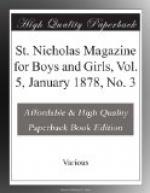DEAR LITTLE SCHOOLMA’AM: In ST. NICHOLAS for December, 1877, Jack-in-the-Pulpit says that “sincere” is made of the words sine-cera, meaning “honey without wax.” I have been told that it refers also to the Greeks, who, when they found a crack in a statue, would sometimes fill the flaw with wax; and that hence a “sincere” statue, one “without wax,” would have no flaw, but be a true and honest statue.
I have not been able to find
any authority for this, otherwise I
should have written sooner.—Yours
sincerely, F.B.J.
[Illustration: FOOLS’-CAPS FOR CROWS.]
FOOLS’-CAPS FOR CROWS.
My acquaintances the crows are very fond of corn, and have a way of picking it out of the ground with their bills just after it has been planted. So the farmers try all sorts of plans to keep them away. One of these plans is shown in the picture.
Paper cones are set point downward in the ground, and baited with a few corn kernels; then some bird-lime is smeared around the insides. When a crow reaches down for the corn, the paper cone sticks to him, looking rather like a fool’s-cap, and he does not get rid of it in a hurry. I’m told that it takes only a few of these cones to keep off a whole flock of crows. They are afraid of making themselves ridiculous, I suppose.
ANCIENTS AND MODERNS.
Now then, my dears, here’s a capital chance to show your knowledge of history. Who can answer this question?
Boston, Mass.
DEAR JACK: Will you please
ask some of your chicks to tell me when
the ancients left off, and
the moderns began?—and you will greatly
oblige. F.
LUMBER AND TIMBER, AGAIN.
The Little Schoolma’am says that “timber” generally means “felled trees,” but is used sometimes to describe trees that are yet standing and growing; “lumber” means timber that has been made ready for use, by sawing, splitting, and so forth.
E.M. Ferguson, J. Harry Townsend, Lillie Stone, J. Dutton Steele, Jr., and N.Y.Z. all sent correct answers; but Virginia Waldo, G.V.D.F., and “Max” were only almost right in their replies.
THE LETTER-BOX.
The answers to Mr. Cranch’s poetical charades, published on page 406 of the April number, are as follows: I., Carpet, car-pet. II., Bargain, bar-gain. III., Pic-nic, pick-Nick. IV., Nightmare, night-mare.
* * * * *
A large number of correspondents kindly point out that the poem entitled “The Nightingale’s Mistake,” printed in the March “Letter-Box,” is also called “The Singing-Lesson,” and was written by Jean Ingelow.
* * * * *
Clayton, Iowa.




